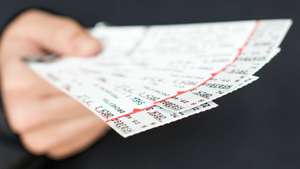Five UK banks have revealed to the BBC that they have seen a two-and-half times increase this year in the number of people being scammed by fraudulent ticket sellers online. A revelation which confirms that - as the live sector has got fully back to business following the COVID lockdowns - so have the scammers.
Many of the fraudulent sales happen on social media, the BBC report notes, with fans thinking that they are buying tickets from other genuine fans unable to attend a show. A sale can begin in comments added to an artist's official Facebook or Twitter posts or in fan groups on social platforms.
Fans eager to buy tickets then connect with the scammers through a messaging app, what appears to be a fan-to-fan conversation occurs, and the buyer ultimately makes a bank transfer to the scammer. They are usually then sent what looks like a digital ticket, but is not.
Earlier this week, Boing Boing reported that scammers are increasingly using Twitter to con people, as brands turn away from the social media site. With the brands themselves less responsive on the platform than before, scammers are posing as customer service agents in their place.
The banks are closely monitoring the fraud because, the BBC explains, they "are signed up to the Contingent Reimbursement Model Code, which aims to reimburse people if they fall victim to an Authorised Push Payment scam 'and have acted appropriately'. An APP scam is when a person is tricked into transferring money into an account operated by a fraudster".
Emily Seymour from consumer group Which? confirms ticket sale scams on social media are commonplace, telling the BBC: "When it comes to ticket sales, particularly, we know that fraudsters and scammers are always looking for anything that they can hook in victims with. Because they know that you really want tickets, you're willing to spend a lot of money on them and you're maybe likely to try and find them".
Secondary ticketing sites like Viagogo and StubHub like to use the prevalence of ticketing scams on social media to justify their existence, arguing that they have measures in place to stop the fraudsters, or - at the very least - they will refund a purchase if it turns out a seller does not have legitimate tickets for a show.
Although, of course, many in the music industry would argue that - while that is true - the touted tickets on the secondary platforms could still be cancelled by the promoter, and therefore fans should only buy tickets from primary ticketing platforms or the usually face-value resale sites approved by a show's promoter.

